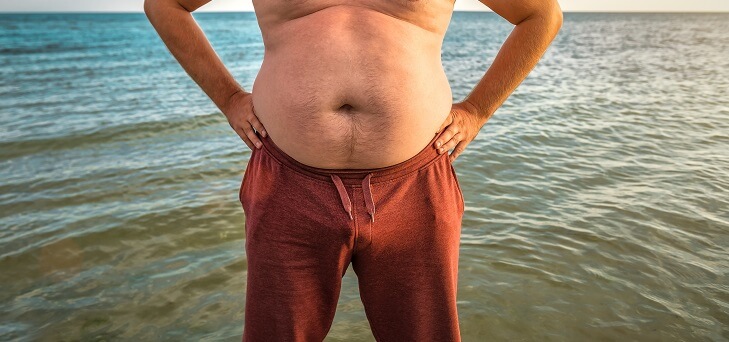Is getting out into the sun good for us? Obviously not if you’re basking in it without applying sunscreen as those rays can lead to deadly skin cancer.
But what about vitamin D? Isn’t it important that we get enough of that? And the sun is a great source of vitamin D. Well, that’s true. And it’s also true that some time in the sun during the winter months can help ward off a case of SAD (Seasonal Affective Disorder).
So there are definitely advantages to be had from exposure to sunlight. However, new research has uncovered a gremlin in the works – but only for men. The gremlin’s name is ghrelin, and it could be playing a part in males getting fat.
Read: Does coffee help you lose weight?
What is the story behind ghrelin, and why is it only a problem for men?
Researchers studying the effects of UV radiation exposure on mice observed raised levels of ghrelin, which just happens to be an appetite-triggering hormone. The researchers, from Tel Aviv University in Israel, were doing skin cancer research when they noticed that direct sunlight on skin raised ghrelin levels – but only in male mice.
This piqued the curiosity of Carmit Levy, a professor in human molecular genetics biochemistry and one of the study’s authors. So she checked the data of about 3000 people aged 26 to 65 who had filled in dietary questionnaires as part of an Israeli government health and nutrition survey, and found something very interesting.
Read: Can you be overweight and healthy?
The data showed that men consumed about 17 per cent more calories – up to 300 extra every day – during the northern hemisphere’s sunnier months (March to September) than they did during other months.
As a follow-up confirmation, the researchers then asked a small sample of people – 13 men and 14 women aged 18 to 55 – to spend 25 minutes outside on a bright, sunny midday wearing sleeveless shirts and shorts before questioning them about their appetite.
They found that men said their hunger levels rose after even this brief sun exposure, while the women experienced no change in appetite.
Why men and not women? The answer appears to be another hormone – oestrogen. It appears the effects of UV radiation on hunger hormones are blocked by the female hormone oestrogen.
Read: Seven ways to a happy home this winter
The study did not link exposure to sunshine directly to male weight gain, but the likelihood of a correlation is pretty high, if you (like me) succumb to hunger pangs without working extra hard to expend the calories.
So, if you’re looking for a simple ‘yes’ or ‘no’ answer to the question of whether exposure to sunlight is good for you, you’re out of luck.
The simplest answer, it seems, is that limited exposure is good but “excessive exposure to sunlight”, according to the Victorian government’s SunSmart website, is not. And the Australian government’s Cancer Council says: “For most people, adequate vitamin D levels are reached through regular incidental exposure to the sun.”
Getting some sun when the UV index is 3 or lower is good for all of us but, if you happen to be male, beware of how hungry you’re getting and watch that calorie count.
If you enjoy our content, don’t keep it to yourself. Share our free eNews with your friends and encourage them to sign up.

